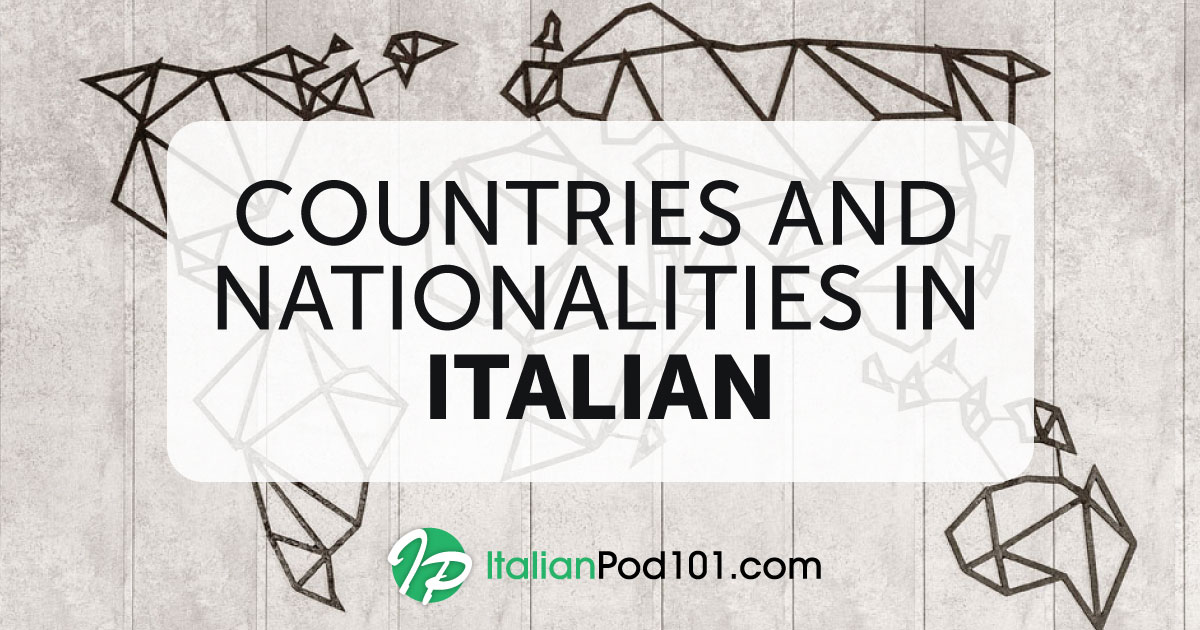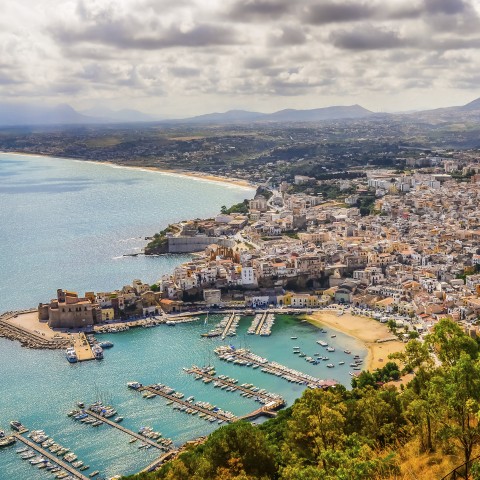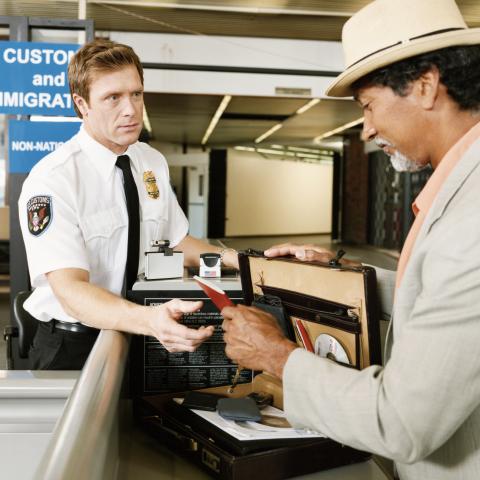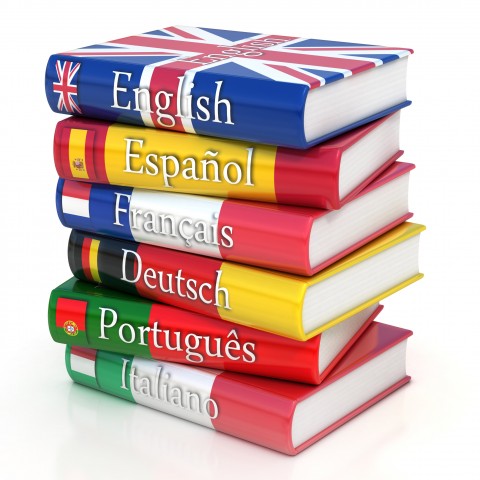
Possibly one of the first things you will be asked as a foreigner traveling or living in Italy, it will be: “Sei straniero? Da dove vieni?” (“Are you a foreigner? Where do you come from?”). That is why it is important to be able to answer with the appropriate vocabulary. And while it is certainly easy to learn and remember the vocabulary related to your nationality, you should be prepared to sustain a conversation about other countries and nationalities, of which there are quite a lot! But don’t worry, once you learn the names of the countries and the name of the nationalities in Italian, you will automatically also know the name of the language and the general adjective for anything related to that country.
Parlo francese ma non amo la cucina francese. (“I speak French but I don’t like french cooking.”)
 Table of Contents
Table of Contents
- Italian Citizenship
- Countries & Continents
- Conversations About Nationalities
- Country, City, Nationality & Language
- Conclusion
1. Italian Citizenship
Even if we often use it to mean the same thing, nationality and citizenship are not necessarily the same. Nationality mainly indicates the cultural, religious, and traditions that link us to a country or to a state. On the other hand, citizenship represents your socio-political belonging to the country that issues your passport. So, if you have Italian citizenship, you can legally obtain an Italian passport, vote in the Italian elections, apply to public service, etc. In other words, you have full civil and political rights
If you have at least one Italian parent, you are immediately recognized as an Italian citizen whether you were born in Italy or a foreign country. This rule is called the “ius sanguinis“, which in Latin means, rather dramatically, “law of the blood.” This law also applies to adopted children.
But there are other ways to become Italian citizens. In fact, in the last few years in Italy there has been an increasing number of people applying for Italian citizenship.
So, what are the requirements to apply for citizenship in Italy?
- Citizenship by marriage (after two years of marriage)
- Citizenship by residence (after five years of uninterrupted residence)
- Citizenship by descent (by demonstrating that you descent from an Italian ancestor)
Over a million people have acquired Italian citizenship in the last decade, of which nearly 800,000 in the last five years. The most represented citizenships of origin are Albanian (26,000 acquisitions, 20.5% of the total), Moroccan (12.5%), Brazilian (8.4%), and Romanian (8%).
2. Countries & Continents
1- Gender and Agreement
In Italian, most countries are singular feminine (l’Italia, la Francia, la Tunisia, l’Irlanda, la Cina, etc. (“Italy, France, Tunisia, Ireland, China,”), but there are exceptions. Some countries are singular masculine, like il Canada (Canada) or il Giappone (Japan), while others are plural, like gli Stati Uniti (The USA) or i Paesi Bassi (The Netherlands).
As you can see from the examples, when talking about a country you always use the article in front of the country name. In fact, if you learn the countries vocabulary together with the article, it will help you remember the gender and use the right agreement.
La Francia è bellissima. (“France is beautiful.”)
La verde Irlanda è molto piovosa in autunno. (“The green Ireland is very rainy in autumn.”)
Gli Stati Uniti sono entrati in guerra nel 1941. (“The United States entered the war in 1941”)

La Sicilia è bellissima! (“Sicily is very beautiful!”)
2- Names and Adjectives
Once you know the country’s name, you could try and guess how to say the word for the people living there and the language spoken there. In fact, the name of the inhabitants and the language spoken in any specific country are the same.
And don’t forget, if you are talking about the people of a specific country, you should use the initial capital letter (gli Italiani, i Canadesi). At the same time, if it’s simply an adjective, there is no need to capitalize, even if you are talking about people (un ragazzo italiano, un ristorante cinese, etc. “an Italian guy, a Chinese restaurant”).
Here are a few examples:
| Country’s name | Noun | Adjective |
| L’Italia (“Italy”) | Un italiano, Un’italiana (An Italian) | italiano (Italian) |
| L’Inghilterra (“England”) | Un inglese, Un’inglese (An Englishman/woman or a British person) | inglese (English) |
| La Cina (“China”) | Un cinese, Una cinese (A Chinese) | cinese (Chinese) |
Did you notice how, to make an adjective out of the name of the country, you sometimes add the suffix -ano/ana (italiano, americana, etc.), other times you add -ese (inglese, cinese, giapponese). These are by far the most common, but you can find other (and sometimes bizarre) ways to for the adjective, such as spagnolo, austriaco, guatemalteco, yemenita.
And in some cases, the adjective has absolutely nothing to do with the root of the country’s name, as in the case of la Germania >> il tedesco… (“Germany >> German”).
There is no rule there, so, unfortunately, you will have to memorize them…
3- Who Comes to Italy, How, and Why?
The majority of the tourists visiting Italy come from neighboring countries. Lately, because of Covid, the number and the proportion of nationalities have changed. In this study prepared by Banca d’Italia, we see the ranking of nationalities visiting Italy in 2019:
| 17.2% | Germany | La Germania (F) | Tedesco/a |
| 12.5% | United States | Gli Stati Uniti (M, PL) | Americano/a |
| 9.9% | France | La Francia (F) | Francese |
| 8.6% | United Kingdom | Il Regno Unito (M) | Britannico/a |
| 5.7% | Switzerland | La Svizzera (F) | Svizzero/a |
| 4.8% | Austria | L’ Austria (F) | Austriaco/a |
| 4.2% | Canada | Il Canada (M) | Canadese |
| 3.8% | Spain | La Spagna (F) | Spagnolo/a |
| 3% | Nederland | I Paesi Bassi (M, PL) Incorrectly called: L’Olanda (M) | Olandese |
| 2.5% | Australia | L’Australia (F) | Australiano/a |
The study made by the Bank of Italy also mentions what are the main reasons for foreigners to travel to Italy, how they travel and how and other information that may not be so interesting to you… but they are a good way to increase the Italian vocabulary needed to hold a conversation about your trip and visit to Italy. Or maybe to be more comfortable when you go through customs at the airport or at any Italian borders.

Motivo del viaggio? (“Reason to travel?”)
Motivo del viaggio? (“Reasons to travel?”)
- – Vacanza. (“Vacation.”)
– Visita a parenti o amici. (“Visit to friends or relatives.”)
– Motivi personali. (“Personal reasons.”)
Dove alloggi? (“Where do you stay?”)
- – Albergo. (“Hotel.”)
– Ospite da parenti o amici. (“With relatives and friends.”)
– Casa in affitto. (“Rental house.”)
– Bed & breakfast.
Che tipo di destinazione preferisci? (“What type of destination do you prefer?”)
- – Culturale, città d’arte. (“City, art, culture.”)
– Al mare. (“At the beach.”)
– Al lago. (“At the lake.”)
– In montagna. (“In the mountains.”)
Come sei arrivato in Italia? (“How did you arrive to Italy?”)
- –In aereo. (“Flying.”)
– In macchina. (“By car.”)
– In treno. (“By train.”)
– In nave. (By ship.”)
- ➜ Do you need to learn more Vocabulary for Nationalities? Check out ItalianPod101 for the perfect free vocabulary list for you!
4- Continents in Italian
| Europe | L’Europa (F) | Europeo/a |
| Asia | L’Asia (F) | Asiatico/a |
| Africa | L’Africa (F) | Africano/a |
| America | L’America (F) | Americano/a |
| Oceania | L’Oceania(F) | Oceaniano/a* |
| Antarctica | L’Antartide | Do people live there? |
*This noun or adjective is rarely used, and Italians tend to call people from Oceania -improperly- Australiani (“Australians”) even when they are Neozelandesi (“New Zealanders”).

Vengo dall’Antartide. (“I come from Antarctica.”)
Especially when talking about great geographical areas, you might need a bit more geographical references such as points and their use:
| North | Il nord |
| South | Il sud |
| East | L’est |
| West | L’ovest |
For example:
Il nord Africa. (“North Africa.”)
Il sud America. (“South America.”)
L’Europa dell’est. (“Eastern Europe.”)
Il Polo nord e il Polo sud. (“North and South Pole.”)
but also
| North | Il settentrione / settentrionale |
| South | Il meridione / meridionale |
| East | L’oriente / orientale |
| West | L’occidente / occidentale |
For example:
Milano si trova nell’Italia settentrionale. (“Milan is in northern Italy”)
Il meridione comprende le regioni italiane a sud di Roma. (“Southern Italy includes all regions below Rome.”)
Il muro di Berlino separava la Germania orientale e occidentale. (“The Berlin Wall used to separate East and West Germany.”)
3. Conversations About Nationalities
When you meet someone new in a foreign country, one of the first topics of conversation that comes up is countries and nationalities. People will ask you where you’re from and possibly how and why you are traveling.
As always with Italian, depending if you are talking to friends or people your age, you will use the casual form of address, or the formal mode, if you are talking with older people or if you are in a very formal setting.

Conversations about nationalities are great icebreakers.
1- Questions & Answers
How to Ask Someone Their Nationality
In this part, introduce a few common ways to ask about nationality. You can briefly explain the differences.
| English | [Casual >> tu] | [Formal >> Lei] |
| Where are you from? | Da dove vieni? or Di dove sei? | Da dove viene? or Di dov’è? |
| What country are you from? | Da quale paese vieni? | Da quale paese viene? |
| What is your nationality? | Qual è la tua nazionalità? | Qual è la sua nazionalità? |
| Are you from France? | Vieni dalla Francia? | Viene dalla Francia? |
| Are you French? | Sei francese? | È francese? |
Here are some examples on how to answer questions about nationalities:
- Sei inglese? No, sono Giapponese. (“Are you British? No, I’m Japanese.”)
- Sono americana, ma i miei genitori vengono dalla Cina. (“I am American, but my parents come from China.”)
- Da dove vieni? Vengo dall’Austria, sono austriaca. (“Where do you come from? I come from Austria, I am Austrian.”)
- Sei tedesco? Sì, sono tedesco, di Berlino. (“You are German? Yes, I’m German, from Berlin.”)
And a few more advanced ones:
- Sono nata in Cile ma sono cresciuta in Italia. (“I was born in Chile, but I grew up in Italy.”)
- Sono brasiliano e italiano. Ho la doppia cittadinanza. (“I’m Brazilian and Italian. I have dual citizenship.”)
- Sono cinese ma vivo in Svizzera. (“I’m Chinese, but I live in Switzerland.”)
- Sono cinese ma abito in Svizzera. (“I’m Chinese, but I live in Switzerland.”)
- Sono italiana ma vivo in Francia da tre anni. (“I’m Italian, but I’ve been living in France for three years.”)
- Mi trasferisco in Inghilterra l’anno prossimo. (“I am moving to England next year.”)
- ➜ For more ice-breakers and conversation starters, we have a free vocabulary list on ItalianPod101 with the Top 15 questions you should know.
2- Prepositions
One thing you definitely need to pay attention to when you talk about places, countries, and cities is the choice of the preposition you need to use.
The general rule is that
- when you are, or when you go to a country, a continent, or an island, you use in;
- When you are, or when you go to a city, you use a;
Vado in vacanza a Roma, in Italia. (“I’m going on vacation to Rome, Italy.”)
Abito in Francia, a Parigi. (“I live in France, in Paris.”)
Sono cresciuta in Sicilia, a Palermo. (“I grew up in Sicily, in Palermo.”)
But notice that when you come back, then the preposition changes into:
- Da when you are coming back from a city;
- Da + article when you are coming back from a country, a continent, an island;
Mario è tornato dall’Italia, da Roma. (“Mario has returned from Italy, from Rome.”)
Quando partirai dalla Sardegna? (“When will you leave Sardinia?”)
Molti sono emigrati dall’Europa in America. (“Many have emigrated from Europe to America.”)
- ➜ If you want to get deeper into Italian prepositions, check out this lesson on ItalianPod101.
4. Country, City, Nationality & Language
Now, let’s go back to a list of countries and expand with what we’ve learned: Name of the country, name of the nationality and language, and name of the major city. You will notice that some of the city’s names are translated… does it happen in your native language too?

How many of these languages do you speak?
Let’s start with the same table we saw earlier, adding more countries and nationalities.
| Country | Italian | Nationality/Language | Major City |
| Germany | La Germania (F) | Tedesco/a | Francoforte (Frankfurt) |
| United States | Gli Stati Uniti (M, PL) | Americano/a | New York |
| France | La Francia (F) | Francese | Parigi (Paris) |
| United Kingdom | Il Regno Unito (M) | Britannico/a | Londra (London) |
| Switzerland | La Svizzera (F) | Svizzero/a | Zurigo (Zurich) |
| Austria | L’ Austria (F) | Austriaco/a | Vienna |
| Canada | Il Canada (M) | Canadese | Toronto |
| Spain | La Spagna (F) | Spagnolo/a | Barcellona (Barcelona) |
| Nederland | I Paesi Bassi (M, PL) | Olandese | Amsterdam |
| Australia | L’Australia (F) | Australiano/a | Sidney |
| Brazil | Il Brasile(M) | Brasiliano/a | Rio de Janeiro |
| Russia | La Russia (F) | Russo/a | Mosca (Moscow) |
| India | L’India (F) | Indiano/a | Nuova Delhi (New Delhi) |
| Japan | Il Giappone (M) | Giapponese | Tokyo |
| Peru | il Peru (M) | Peruviano/a | Lima |
| Portugal | Il Portogallo (M) | Portoghese | Lisbona (Lisbon) |
| Tunisia | La Tunisia (F) | Tunisino/a | Tunisi (Tunis) |
| China | La Cina (F) | Cinese | Pechino (Beijing) |
| Kenia | Il Kenia (F) | Keniano | Nairobi |
| Turkey | La Turchia (F) | Turco/a | Istanbul |
Now you have all you need to use the vocabulary about nationalities, countries, languages, and cities, and you are ready to combine them all to introduce yourself and start a conversation.
Here are some examples:
- Sono tedesca. Sono nata a Francoforte, ma adesso vivo a Ginevra, in Svizzera.
(“I’m German. I was born in Frankfurt, but now I live in Geneva, Switzerland.”) - Sono americano, ma sono cresciuto nel Nord Africa.
(“I’m American, but I grew up in Northern Africa.”) - Siamo brasiliani, ma abitiamo a Londra da qualche anno con la nostra famiglia.
(“We are Brazilians but we’ve been living in London for a few years with our family.”) - Sono francese e vivo a Montreal, in Canada. Sapevi che in Quebec si parla francese?
(“I’m French and I live in Montreal, Canada. Did you know that in Quebec they speak French?”) - Mi sono trasferita in Brasile tre mesi fa. Non parlo ancora bene il portoghese.
(“I moved to Brazil three months ago. I still don’t speak Portuguese well.”)
- Sono italiano e brasiliano. Sono cresciuto e Rio de Janeiro e ha la doppia cittadinanza.
(“I am Italian and Brazilian. I grew up in Rio de Janeiro and have dual citizenship.”) - È spagnola, ma parla benissimo il francese e fa un corso di cucina francese.
(“She is Spanish, but speaks French very well and takes a French cooking class..”)
- ➜ Telling where you’re from and what language you speak is a great starting point. To go a bit further, you can check out our vocabulary list with ten lines to introduce yourself in Italian on ItalianPod101.
5. Conclusion
In this guide, you have learned everything about nationalities, from the names of countries and cities to adjectives and languages, capitalization rules, gender agreement, and prepositions. You also learned about the countries that are often visiting Italy, and how they spend their stay.
You should now be ready to break the ice in any situation, introduce yourself at your arrival, and even form some complex sentences with all these new words.
Did I forget any important topic on nationalities or country names you’re interested in? Feel free to share it with your fellow students in the comments below!
A good exercise to practice nationality vocabulary is to create fictional introductions where you combine the name of countries and cities, languages, and adjectives, using the right genders and prepositions. You can start simple and gradually add more complexity when you feel comfortable enough.
ItalianPod101 also has tons of vocabulary lists with audio recordings and free resources to boost your studies and keep your Italian learning fresh and entertaining!
Remember that you can also use our Premium PLUS service, MyTeacher, to get personal 1-on-1 coaching with your own private teacher so that you can practice these new words and much more.
Along with assignments, personalized exercises, and recording audio samples just for you, your teacher will review your work and help improve your pronunciation. Have fun with ItalianPod101!









